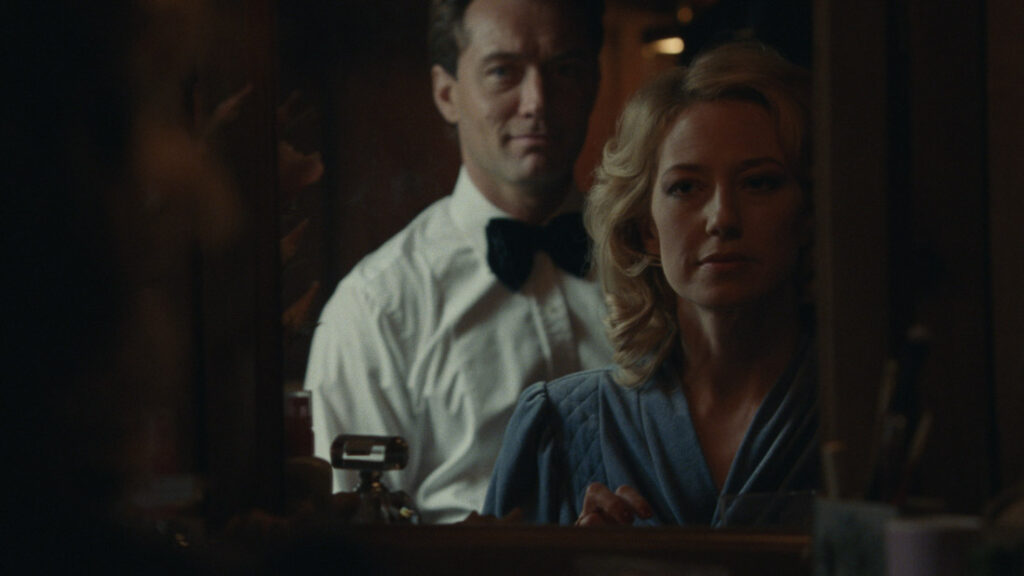A pair of performance showcases landed in Park City this year, centering some of our best actors doing some of the best work of their careers. One also came with the added thrill of seeing the great Sean Durkin return to Sundance for the first time since his breakthrough, “Martha Marcy May Marlene,” and while several of the sophomore efforts this year were disappointments, Durkin’s was absolutely not for this viewer. Sharp and riveting, “The Nest” is one of my favorite films of Sundance 2020, and I think the conversation around it will be a fascinating one once it’s finally released. It’s not a film for everyone—for everyone at Sundance who had it in their top five, someone had it in their bottom five—but divisive movies are often hard to find in a festival built around crowdpleasers. It’s nice to have a movie worth talking about.
Set in the ‘80s, “The Nest” is the story of a family transplanted from the United States to London after the patriarch Rory (Jude Law) rejoins the firm he left years ago to build a family in America. Rory thinks he’s returning as a conquering hero, someone who learned business techniques from the Americans that will make him a multi-millionaire in England, although there are cracks in this façade from the very beginning. Rory buys a massive estate that his family clearly can’t afford, and grows increasingly distant from his wife Allison (Carrie Coon) and two children, who develop problems of their own in this new environment.
Allison is the tactile opposite of Rory. Whereas he deals in numbers and futures, she gets her hands dirty, running a stable on the family property. The differences between the two, which are subtle at first, start to become more pronounced as Rory’s sham existence starts to crumble. Rory is constantly buying symbols of wealth he can’t afford and bragging in ways that social climbers often do to measure their importance. As Rory and Allison’s marriage starts to disintegrate, the kids suffer and even the house starts to grow more ominous and terrifying. There’s no safety for this family anymore, even in the nest.
Durkin’s script gives Coon and Law two of the best characters of their careers and both actors completely deliver. As Rory and Allison slowly pull away from each other with passive-aggressive exchanges, the acting here is breathtaking. Both performers have clearly given these two characters so much depth and back story that every action and even line feels genuine, even the ones that surprise them. They’re two of the most fully-realized characters I’ve ever seen at Sundance, thanks not just to the talents of Law and Coon but the incredibly smart and sharp dialogue given them by Durkin. Several films this year have reminded me of Edward Albee (“Shirley,” “Black Bear”) and this is another one in which great play writing came to mind as Law and Coon deliver some of the fest’s best dialogue.
And yet “The Nest” is far from a filmed play. Durkin gives it an ominous film language too, shooting down long hallways in which this family looks like they’re being swallowed by the massive estate, a symbol of the wealth that Rory values above all else. Durkin almost entirely eschews the close-up that would highlight the faces of his stars, keeping us at a distance and through doors, barely lighting his cast at times. They’re getting lost in this world of fur coats and fancy parties, losing their identity, and the visual language reflects that theme. It’s just one of many aspects of “The Nest” that is worth unpacking and discussing how it plays into the entire project’s impact, one that I’m still feeling days after I saw it.

Less successful overall but with the Sundance performance that I suspect the most people will be talking about when the next awards season rolls around is Florian Heller’s moving “The Father,” one of several films I saw at Sundance this year about dementia, and easily the most moving of this new subgenre. Sir Anthony Hopkins gives one of the most vulnerable and emotional performances of his career as a man whose world starts to shift and change around him under the sway of dementia. It’s a tough watch but a structurally powerful piece of storytelling with a powerhouse performance at its center, matched by a supporting ensemble that doesn’t have a weak link.
Anthony is almost 80 and his daughter Anne (Olivia Colman) has come to take care of him, encouraging him not to fire the latest caretaker she’s brought into his flat, as he has so many others. Anne won’t be able to come over every day—she’s moving to Paris—and Anthony needs to recognize his increasing limitations. What starts as a relatively straightforward drama shifts on-screen to become a literal representation of dementia. Anne appears again played by OIivia Williams, and she’s not moving to Paris. The confusion about who people are, what day it is, etc. becomes reflected in the storytelling, locking us into the increasingly troubled POV of Anthony.
Heller adapts his award-winning play with the help of the great Christopher Hampton (“Atonement”) and both give their cast incredibly powerful parts, even if they never quite figured out how to break “The Father” out of its inherent theatricality. Still, even if you think this is a “filmed play,” it’s an amazing powerful one of those, thanks largely to the subtle work by Colman and the deep well of emotion tapped by Hopkins. The Oscar winner has often played clinical, cold characters, and so seeing him break down here feels even more devastating, like seeing someone who’s never shed a tear in public become scared for the first time in his adult life. Hopkins captures a proud, confident man torn down by something he can’t control, and the impact is unforgettable.











